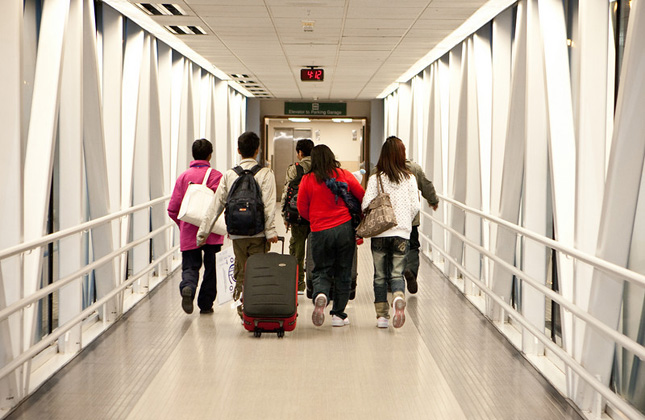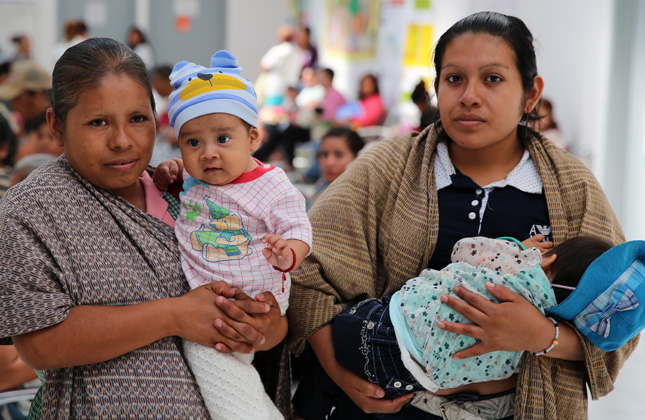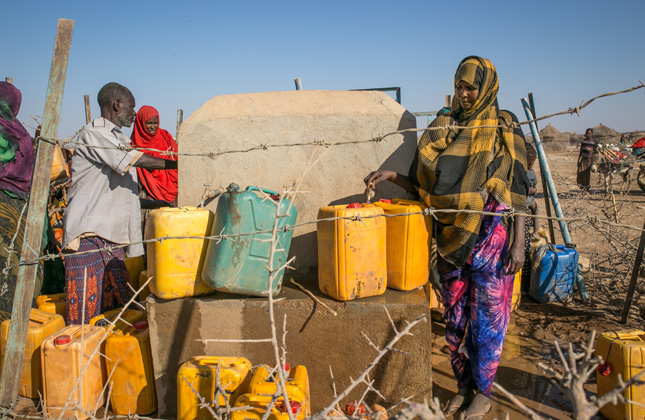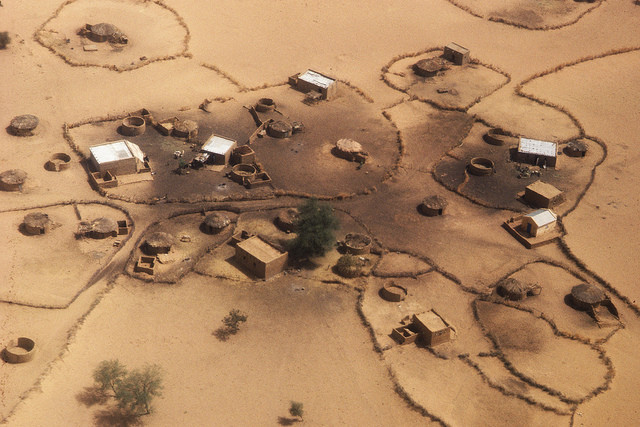-
Climate Variability, Water, and Security in El Salvador
›
Water-related challenges in El Salvador have acquired far greater significance over the past decade as they have intersected with other social problems including migration, criminal violence, and drug trafficking. When combined, these factors pose threats to domestic and regional stability. Damaging heavy rains, droughts, and rising temperatures are exacerbated by steadily intensifying El Niño oscillations and threaten the production of staple and export crops. The declining viability of rural livelihoods is driving many farming families to migrate to urban centers or across borders. Food security is a constant concern across the region, and millions already rely on humanitarian assistance. Infrastructure has been damaged repeatedly by floods and raging rivers. El Salvador can mitigate many of these risks by employing ecological landscape restoration. Improving the soil’s capacity to retain and regulate water will help maintain both agricultural and ecological viability.
-
Flooding in Bangladesh: Calling Out Climate Change From the High Ground
›
Floods have taken the lives of more than 100 people in northern Bangladesh over the last two weeks. Fully one third of the country has been flooded and some 600,000 people have been displaced in the riverine nation as a result of monsoons in India and Nepal. At international climate forums, Bangladeshi diplomats consistently decry such disasters as part of their urgent calls for action to mitigate changing weather patterns worldwide. But here in the country’s Rangpur-Kurigam region, both authorities and citizens have been reluctant to attribute these deadly disasters to the effects of climate change.
-
Building Resilience for Peace: Water, Security, and Strategic Interests in Mindanao, Philippines
›
The Philippines faces a breadth of social and environmental challenges that threaten its economic and political stability. A long history of violent conflict stemming from ethnic, religious, and political tensions is further complicated by changing weather patterns that cause severe drought and damaging storms. Millions of people in Mindanao have been displaced by violence and extreme weather events, and their migration from rural areas leaves room for the expansion of terrorist groups that threaten regional stability. The United States currently has strong trade and cultural ties to the Philippines, and U.S. Pacific Command operates military facilities on the islands. This chapter examines the stakes for U.S. interests in Mindanao, and recommends a security approach that combines defense, diplomacy, and development efforts to promote improved governance, social stability, and climate resilience.
-
Planning to Move: Relocating Coastal Communities in the United States
› Sea-level rise will put approximately 13 million coastal Americans at risk of displacement by 2100, but the first to move will be the most vulnerable communities. In Reaching Higher Ground: Avenues to Secure and Manage New Land for Communities Displaced by Climate Change, Wilson Center Global Fellow Maxine Burkett and her coauthors look at Native American communities on the frontlines of climate change as a model for how vulnerable coastal communities can successfully relocate. Currently, there is no central mechanism within the federal government for relocating communities displaced by climate change. Federally recognized Native American communities have historically coexisted alongside the United States government as sovereign entities, and their many avenues – legal, policy, and corporate – to acquire land could provide a starting point for addressing this imminent challenge. The authors identify tools communities can use to secure new homes and preserve their ownership of evacuated lands.
Sea-level rise will put approximately 13 million coastal Americans at risk of displacement by 2100, but the first to move will be the most vulnerable communities. In Reaching Higher Ground: Avenues to Secure and Manage New Land for Communities Displaced by Climate Change, Wilson Center Global Fellow Maxine Burkett and her coauthors look at Native American communities on the frontlines of climate change as a model for how vulnerable coastal communities can successfully relocate. Currently, there is no central mechanism within the federal government for relocating communities displaced by climate change. Federally recognized Native American communities have historically coexisted alongside the United States government as sovereign entities, and their many avenues – legal, policy, and corporate – to acquire land could provide a starting point for addressing this imminent challenge. The authors identify tools communities can use to secure new homes and preserve their ownership of evacuated lands. -
Focus on Refugee Skills To Move Beyond Arguments About Resettlement
›
In a June 12 speech to governments and NGOs at UNHCR’s annual consultations on refugee resettlement in Geneva, UN High Commissioner for Refugees Filippo Grandi made a passionate plea for additional resettlement pledges from participating nations. He will likely be disappointed.
-
Meeting the Maternal and Newborn Needs of Displaced Persons in Urban Settings
›
More than 60 percent of the world’s refugees and 80 percent of internally displaced persons (IDPs) now live in urban areas. In contrast to traditional refugee camps, which have mainly been in rural areas, cities and other urban settings can offer refugees greater economic opportunities, a degree of anonymity, and better access to services—at least in theory, said Mary Nell Wegner, executive director of the Maternal Health Task Force, at the Wilson Center on May 31. However, in practice, the urban advantage may be a myth, as local systems, already strained by growing populations, are not well equipped to handle a large influx of people with complex needs.
-
David Reed, World Wildlife Fund-US
U.S. National Security and Prosperity Under Rising Pressure From Water Stress
›
U.S. prosperity and national security depend directly on the prosperity and stability of our partner countries and competing countries around the world. Today, water-driven stresses are, with increasing frequency, undermining economic productivity, weakening governance systems, and fraying social cohesion. Water scarcity has created a context of human and societal need wherein water stress has undermined the vitality of rural livelihoods, driven broad migratory movements, become a weapon of war, contributed to the growth of insurgencies and terrorist networks, and given rise to increased demand for U.S. development, humanitarian, and military assistance.
-
Climate, Conflict, and Refugees: Examining the Impact of Environmental Change on Human Security
›
“There’s a long list of crises that can have a natural resource base,” said Anne C. Richard, former assistant secretary of state for population, refugees, and migration, at a Stimson Center panel on June 13, 2017, on the impacts of climate change on human security and mobility. The panelists included Kelly McFarland of Georgetown’s Institute for the Study of Diplomacy (ISD), Rod Schoonover of the National Intelligence Council, and Sally Yozell, director of Stimson’s Environmental Security Program.
Showing posts from category migration.


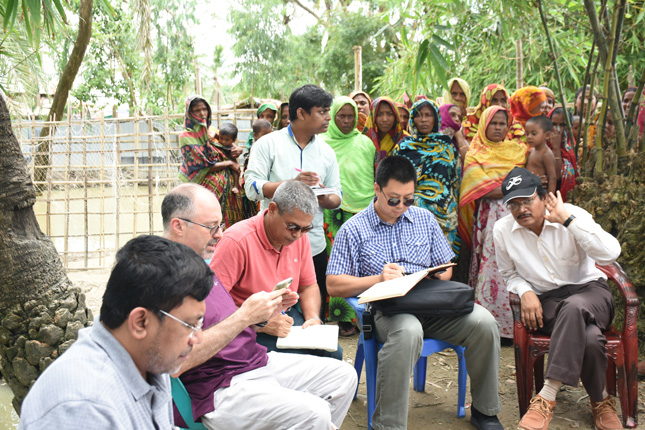
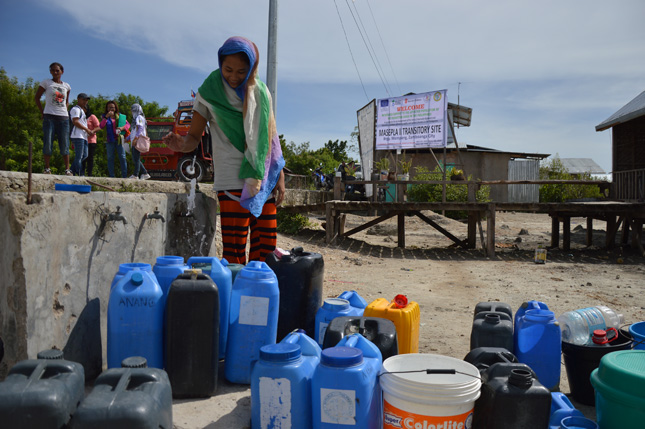
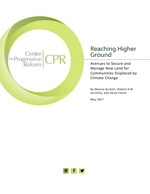 Sea-level rise will put approximately 13 million coastal Americans at risk of displacement by 2100, but the first to move will be the most vulnerable communities. In
Sea-level rise will put approximately 13 million coastal Americans at risk of displacement by 2100, but the first to move will be the most vulnerable communities. In 